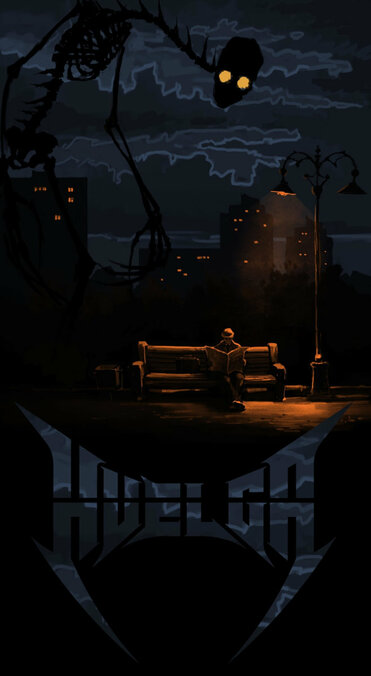 Here’s something I’m comfortable admitting: at first blush, Huelga’s self-titled debut EP made for an exceedingly frustrating experience. Inconsistent. Illusive. Nonsensical. Not, in other words, the terms one might enjoy having applied to their passion project of more than a decade. However, after continued exposure and a certain degree of reflection, it became apparent that Huelga is a remarkable effort with a patently unique perspective. Multi-instrumentalist Michael Fonseca--who brings a background in jazz and an apparent interest in the non-conformist and modernist compositions of Zappa and Ives--isn’t here to recycle wrought notions of genre expectation. Huelga, in other words, operates exclusively outside the bubble of comfortable expectation, and for that reason alone, it’s worth our collective whiles. Despite appearing to wear the heavy sonic trappings of groove, thrash and (ill-defined) mathcore, Fonseca's approach aligns the project with avant-garde jazz. Thus, from an instrumental perspective, there’s a mind-boggling amount to discuss--especially given Huelga’s 15 minute run-time. Making ample use of squealing leads, melodic dissonance, poly-rhythms, and aggressively fluid tempos, Huelga offers few moments for the listener to sink in and grasp what is actually happening. Riffs meld and adapt with startling frequency, disappearing into the fold one moment, only to reemerge in some vastly redefined form further down the road, shaped by the rolling boil of seemingly spontaneous invention. Even if this isn’t free-form composition in the true sense of the term, the semblance of improvisation is enough to evoke those noise and jazz connections. Intro track “The Very Marrow of Our Bones” is an effective crash course in Fonseca's methodology--in under 3 minutes, one careens through a deluge of colorful melody, downtuned groove, and an oddly harmonious percussive elements. At times "Marrow" feels djent-y in its distorted technical intensity, but churning thrash elements and pull-out-the-carpet percussion prevent anything approaching stagnation. “Chinga de Perro” and the 2-part “No Word for Blue” continue this pattern, although the latter--the album highlight, in my humble opinion--does feel slightly more consistent, due to its use of identifiable melodies across the first half. Huelga is not clever because its complicated. Rather, it is clever because it demonstrates a complex understanding of modern arrangement, and utilizes the tools it has avaliable to effectively illustrate a central contextual background. Inspired by the Chicano Movement and the obvious stress and violent intentions that arise from a border defined, in many way, by borderline xenophobia, Foncesa is decidedly mission-based. To quote his bio, Huelga “takes a stand against the anti-Latinx, anti-immigrant sentiment that pollutes ‘The Land of the Free’ today.” To this end, the arrangements herein do an inordinately good job at creating--and reflecting--a palpable sense of tension. This particular scribe is a firm believer that art is, inherently speaking, a product of its political environment. In the case of Huelga, this environment feels essential to both the musical impact and approach. How best to summarize a project that so willingly denies categorization? In short, the musical virtuosity on display is undeniable. That said, intriguing and ear-catching instrumentation does not (necessarily) a good song make, and the absence of traditional structure can make for a jarring listening experience if you’re approaching Huelga on a casual level. But yet, these moments of melodic dissonance, of tempo-shifting blindsides, and of seemingly blatant inconsistency are what define Huelga’s unique sonic assault. As such, Huelga highlights a truth that we often miss: there is undeniable beauty in the unexpected. Take, for example, the bright chime that claims a brief moment in the spotlight on “Chinga de Perro.” Seemingly uncalculated, it adds an unexpected flair to the full picture, a moment of interest in a sea of interesting moments. Like so many across this debut, this glimmer exudes gleeful revelry in its rejection of expectations. Lack of continuity gives the affair, for obvious reasons, a disconnected and ungrounded aura--a “floating world” feeling where technical aspects astound, but the (seeming) lack of foundation offers a challenge to the audience. In the context of a more prototypical work, this would undoubtedly come across as criticism. Not so here. Fonseca is seeking, it would seem, to disassemble our understanding of the ways in which heavy music can operate. After several encounters, I’ve come to realize that he succeeds incredibly. Huelga’s self-titled debut will be released April 5th, 2019.
2 Comments
|
Welcome!
We provide thoughtful reviews of music that is heavy, gloomy...and loud enough to wake us from slumber. Written by a highfalutin peasantry!
|

 RSS Feed
RSS Feed